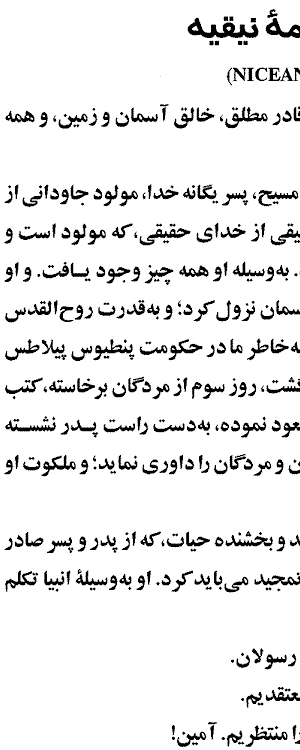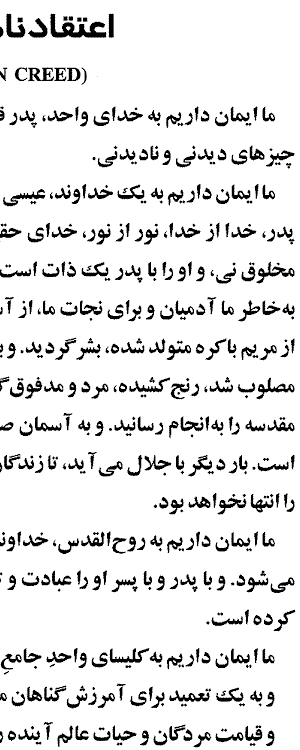
Worldwide Directory of Iranian/Persian Christian Churches
كليساى ايرانيان در دنيا
Conferences -
کنفرانس کلیساها
Asia
- آسيا
Australia,
New Zealand
Canada

Europe
- اروپا
Middle East
U.S.A.
Get a Free copy of Persian Injil (Farsi New Testament) for personal use or gift to an Iranian family/friend
or Print A Copy of Bible
Love: 1 Corinthians 13:1-13
Nicean Creed

Iranian Christian Organizations
Related Links
FAQ

|
The Creed of Nicea - 325 A.D.(Printable Version)

|

|
|---|
The Creed of Nicea - 325 A.D.
We believe in one God, the Father All-sovereign, maker of heaven and earth, and of all
things visible and invisible.
We believe in one Lord Jesus Christ, and the only-begotten Son of God, Begotten of the Father
before all the ages, Light of Light, true God of true God, begotten not made, of one
substance with the Father, through whom all things were made; who for us men and for
our salvation came down from the heavens, and was made flesh of the Holy Spirit and
the Virgin Mary, and became man, and was crucified for us under Pontius Pilate, and
suffered and was buried, and rose again on the third day according to the Scriptures,
and ascended into the heavens, and sits on the right hand of the Father, and comes
again with glory to judge living and dead, of whose kingdom there shall be no end.
We believe in the Holy Spirit, the Lord and the Life-giver, that proceeds from the Father,
who with the Father and Son is worshipped together and glorified together, who spoke
through the prophets.
We believe in one holy catholic and apostolic church.
We acknowledge one baptism unto remission of sins.
We look for a resurrection of the dead,
and the life of the age to come.
(Printable Version)
NOTES AND COMMENTS ON THE NICEAN CREED
The Nicean Creed is the most widely accepted and used brief
statements of the Christian Faith. In liturgical churches, it is
said every Sunday as part of the Liturgy. It is Common Ground to
East Orthodox, Roman Catholics, Anglicans, Lutherans, Calvinists,
and many other Christian groups. Many groups that do not have a
tradition of using it in their services nevertheless are committed
to the doctrines it teaches.
"What about the Apostles' Creed?" - Traditionally,
in the West, the Apostles' Creed is used at Baptisms, and the Nicene
Creed at the Eucharist (aka the Mass, the Liturgy, the Lord's
Supper, or the Holy Communion). The East uses only the Nicene Creed.
When the Apostles' Creed was drawn up, the chief enemy was
Gnosticism, which denied that Jesus was truly Man; and the emphases
of the Apostles' Creed reflect a concern with repudiating this error.
When the Nicene Creed was drawn up, the chief enemy was Arianism,
which denied that Jesus was fully God. Arius was a presbyter
(=priest = elder) in Alexandria in Egypt, in the early 300's. He
taught that the Father, in the beginning, created (or begot) the
Son, and that the Son, in conjunction with the Father, then
proceeded to create the world. The result of this was to make the
Son a created being, and hence not God in any meaningful sense. It
was also suspiciously like the theories of those Gnostics and pagans
who held that God was too perfect to create something like a
material world, and so introduced one or more intermediate beings
between God and the world. God created A, who created B, who
created C... who created Z, who created the world. Alexander, Bishop
of Alexandria, sent for Arius and questioned him. Arius stuck to
his position, and was finally excommunicated by a council of
Egyptian bishops. He went to Nicomedia in Asia, where he wrote
letters defending his position to various bishops. Finally, the
Emperor Constantine summoned a council of Bishops in Nicea (across
the straits from modern Istambul), and there in 325 the Bishops of
the Church, by a decided majority, repudiated Arius and produced the
first draft of what is now called the Nicene Creed. A chief
spokesman for the full deity of Christ was Athanasius, deacon of
Alexandria, assistant (and later successor) to the aging Alexander.
The Arian position has been revived in our own day by the Watchtower
Society (the JW's), who explicitly hail Arius as a great witness to
the truth.
|
Apostle's Creed
- I believe in God the Father, Almighty, Maker of heaven and earth:
- And in Jesus Christ, his only begotten Son, our Lord:
- Who was conceived by the Holy Ghost, born of the Virgin Mary:
- Suffered under Pontius Pilate; was crucified, dead and buried: He descended into hell:
- The third day he rose again from the dead:
- He ascended into heaven, and sits at the right hand of God the Father Almighty:
- From thence he shall come to judge the quick and the dead:
- I believe in the Holy Ghost:
- I believe in the holy catholic church: the communion of saints:
- The forgiveness of sins:
- The resurrection of the body:
- And the life everlasting. Amen.
|
The Apostle's Creed - History & origin
The Symbolum Apostolorum was developed between the second and ninth centuries. It is the most popular creed used in worship by Western Christians. Its central doctrines are those of the Trinity and God the Creator.
Legend has it that the Apostles wrote this creed on the tenth day after Christ's ascension into heaven. That is not the case, though the name stuck. However, each of the doctrines found in the creed can be traced to statements current in the apostolic period. The earliest written version of the creed is perhaps the Interrogatory Creed of Hippolytus (ca. A.D. 215). The current form is first found in the writings of Caesarius of Arles (d 542).
The creed was apparently used as a summary of Christian doctrine for baptismal candidates in the churches of Rome. Hence it is also known as The Roman Symbol. As in Hippolytus' version it was given in question and answer format with the baptismal candidates answering in the affirmative that they believed each statement.
|
Traditional English Version
I believe in God the Father Almighty, Maker of heaven and earth.
And in Jesus Christ his only Son our Lord; who was conceived by the Holy Ghost, born of the Virgin Mary, suffered under Pontius Pilate, was crucified, dead, and buried; he descended into hell; the third day he rose again from the dead; he ascended into heaven, and sitteth on the right hand of God the Father Almighty; from thence he shall come to judge the quick and the dead.
I believe in the Holy Ghost; the holy catholic Church; the communion of saints; the forgiveness of sins; the resurrection of the body; and the life everlasting. AMEN.
|
Modern English Version
I believe in God, the Father almighty,
creator of heaven and earth.
I believe in Jesus Christ, God's only Son, our Lord,
who was conceived by the Holy Spirit,
born of the Virgin Mary,
suffered under Pontius Pilate,
was crucified, died, and was buried;
he descended to the dead.
On the third day he rose again;
he ascended into heaven,
he is seated at the right hand of the Father,
and he will come again to judge the living and the dead.
I believe in the Holy Spirit,
the holy catholic church,
the communion of saints,
the forgiveness of sins,
the resurrection of the body,
and the life everlasting. AMEN.
|
|








